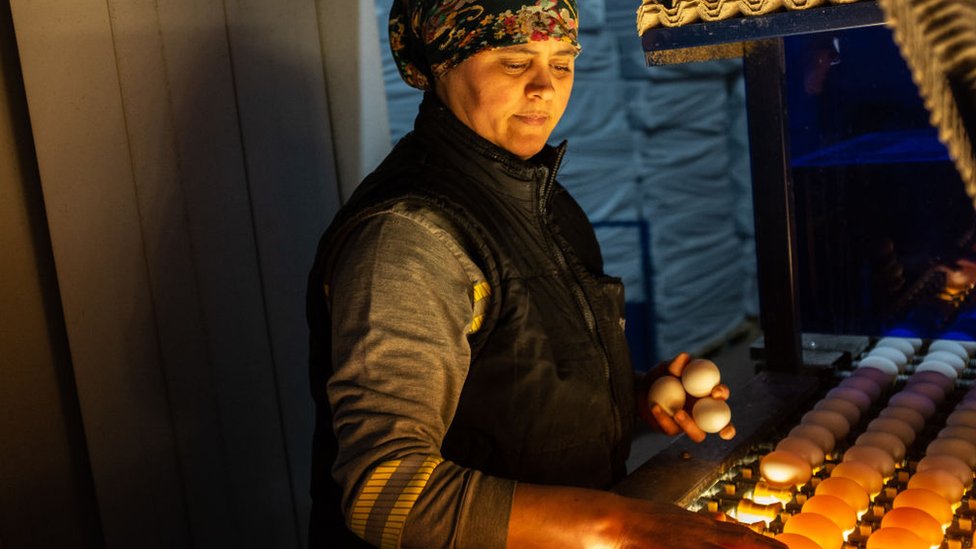Jakarta –
Prices of various goods in Turkey are increasing at the fastest pace in 24 years, according to recent official data.
Average annual inflation hit 78.62% in June, which was actually higher than expected.
The increases in transportation costs and housing prices were among the sharpest, including as a result of the war in Ukraine.
Also read:
Inflation has actually been on the rise since 2021, when Turkish President Recep Tayyip Erdogan cut interest rates to boost the economy.
What often happens when other countries experience this condition is that interest rates are raised to reduce inflation.
However, Erdogan instead called interest rates “the mother and father of all evil”. He used unconventional policies to lower prices, including intervening in the foreign currency market.
Getty Images
As a result of cutting interest rates from 19% to 14%, the exchange rate of the Turkish lira plummeted, causing the country to bear more costs when importing goods from abroad.
In the latest data, the transportation sector is the one with the highest price increase, by 123% from last year.
The increase in the price of food and non-alcoholic beverages was in second place with a 94% increase in prices. The next rank was occupied by household appliances which reached 81%.
Overall, the current inflation rate is rated as the highest since September 1998, when annual inflation hit 80.4% and as Turkey battled high inflation for a decade.
‘It is with a heavy heart we are closing our bakery’
One Indonesian citizen who lives in Ankara, Irma Umak, 39, said that the recent economic situation had an impact on the small business he had built.
Two years ago, Irma and her husband who is a Turkish citizen opened a small bakery.
According to Irma, the bakery business initially went smoothly even though it started in the midst of a pandemic. Especially once the pandemic situation begins to subside and schools reopen.
At the bakery, Irma also sells Indonesian food on weekends. Many Indonesian citizens and representatives from embassies stopped by their small shop.
“But since the crisis hit all the raw materials for bread-making have increased dramatically in just a matter of days,” Irma told BBC News Indonesia.
For example, he said, 50 kilograms of flour previously cost 170 lira, but recently it has reached 475 lira. Not to mention the increase in the price of other ingredients such as sugar, eggs, oil, and others.
“Every spending price is always different and increases by more than 50% in a matter of days, so the capital cannot be returned because the expenditure is greater,” said Irma.
In addition, shop rental costs, electricity rates, and water have also increased.
Increasing the price of their merchandise cannot be a solution, because the customers will not be able to buy.
“Finally with a heavy heart we were forced to close our bakery, about two months ago,” he said.
Currently Irma and her family survive by selling food online with a delivery system.
Meanwhile, the cost of their household needs has doubled because prices are still increasing until now.
“Currently we depend on business catering That’s all, in the future, I don’t know yet,” he said.
Food prices, house rent, and wedding costs skyrocket
An Istanbul resident, Mer Faruk Aydemir, 33, told BBC News Indonesia how inflation in his country forced him, as a middle-class resident, to cut his spending by half as much as usual.
All prices skyrocketed, starting from the price of food, rent a house, to travel costs.
For example, the rental price for his residence in the Istanbul area, which last year was around 2,000 Lira, has now skyrocketed to 5,000 Lira per month.
Three months ago, Mer visited a house that he planned to buy with his family. When they arrived, the house was sold for 1.4 million Lira.
But within 30 minutes of their arrival, the property owner informed them that the price of the house had risen to 2 million Lira.
“It can take up to 10 years to save and be able to buy a house, but the owner of the property can raise the price that high in just 30 minutes,” he said.
Not to mention the skyrocketing food prices. The price of bread, for example, rose from 2.5 Lira from last year to 4 Lira. The price of 1 kilogram of rice rose from around 8 Lira to 15 Lira. Meanwhile, the price of 1 kilogram of beef has doubled to 200 Lira.
“If people could eat two eggs a day last year, now they can only eat one egg a day. People’s quality of life is starting to decline,” said Mer.
Many people are no longer able to take vacations, buy new clothes, or cars. In fact, Mer says many young people are delaying their weddings because the costs have skyrocketed.
“Last year’s wedding cost, for example, was around 1,000 Lira, but if you get married today, the cost can be doubled,” he said.
The Turkish government has raised the minimum wage, but according to Mer the increase is not worth the much higher inflation.
“I myself have to cut almost half my expenses. Usually I can vacation abroad up to two times a year, now I can’t go anywhere,” said Mer.
“We’re starting to lose hope for our future. When your money is worthless, you can’t do what you want and what makes you happy”
“I felt like my life was really being curtailed, and the situation was getting worse by the day,” he said.
Mer, like several young people he knows, plans to move and find jobs abroad that are considered more promising.
Because he feels that although the situation in his country is gradually improving, it will not be as good as it was 10 years ago.

Egg prices in Turkey are currently up about 178% compared to 2021. (Getty Images)
‘Prices for foreigners are pegged higher’
It’s a different story for an Indonesian student living in Istanbul, Darlis Aziz, 29, who said that the price increase that occurred in Turkey actually had little impact on him.
This happened because Darlis also had income in Rupiah and the depreciation of the Lira made the exchange rate very low.
“Even though prices have gone up, for us Indonesian citizens are still affordable because if we get income from the rupiah we can still offset the rising prices in lira,” Darlis told BBC News Indonesia.
However, Darlis said, the situation caused foreigners to be “charged more” in some ways.
For example, the price for renting a house, which used to be around 3,000 Lira per month, has now more than doubled to 7,000 Lira.
“Then the price of food at food stalls for foreigners is set higher. This is very felt for us,” said Darlis.
Analysis: Betting Erdogan
By Victoria Craig, Business correspondent BBC
When inflation in Turkey is getting worse, the country’s economy is getting worse, which is marked by a decline in the currency exchange rate.
The Turkish lira has lost nearly half its value in the past year. This means that the purchasing power of consumers in Turkey is decreasing, but the prices of goods and services continue to skyrocket.
Although inflation in June hit a 24-year high, economists believe inflation rates will continue to soar. This is the second month that official data have missed estimates, so many doubted the validity of official data from Turkey’s statistical agency.
Doubts have only deepened because ahead of the May inflation data being released, the head of the price statistics department resigned citing health reasons.
While people living and working in Turkey are struggling, travelers from Western countries are increasingly attracted to Turkey for holidays because of the exchange rate in their favour.
On the other hand, there are fewer domestic tourists. In order to be able to take a vacation, they shorten the vacation period and repay the bill in 10-12 months.
This high inflation is certainly making the business world in trouble
“I’ve never had a season like this,” said Volkan Yorulmaz, general manager of Kemer Holiday Club in Antalya.
“I can’t budget for expenses because prices change from day to day. The concept of all expenses covered can’t be used anymore.
“More than 50% of our guests come from Russia or Ukraine, so without their presence, the beginning of the season becomes a bit problematic.
“Turkish people try to come for holidays. They use credit cards or pay in installments, or shorten vacation plans so that” [biayanya] affordable for them.”
See also ‘LGBT march in Turkey ends in chaos, police arrest 36 people’:
(it/it)
–


